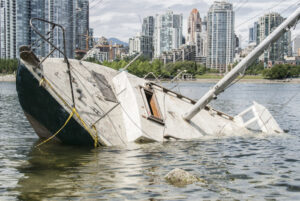 When you are out to sea, and your boat capsizes, there is nothing you can do but wait to be rescued. Capsizing boats are quite common, but you can prevent a deadly mistake if you know which type is likely to sink.
When you are out to sea, and your boat capsizes, there is nothing you can do but wait to be rescued. Capsizing boats are quite common, but you can prevent a deadly mistake if you know which type is likely to sink.
Small boats such as canoes, kayaks, and sailboats are more likely to capsize than heavy-bottomed boats. This is because the latter becomes unstable easily on the water since they have a weight limit. That doesn’t mean larger boats cannot capsize at all. To know that any boat can go under, you only have to see how the HMHS Britannic sank.
However, unlike a large boat that sinks quickly, a smaller capsizing boat usually remains afloat, so it provides survivors with a makeshift raft as they wait to be rescued. Kayaks and canoes can also be flipped right side up by a single person, and even a sailboat can be righted with several people.
In other words, while small boats are more likely to sink than larger ones, you have higher chances of surviving the former than the latter.
Weight distribution and amount are responsible for capsizing boats more than anything else. Here are some ways how:
Most 20-feet boats need floatation and a capacity plate that shows the amount of weight they can carry without submerging. The boat will capsize even in calm waters if you exceed those limits. Operators will also ticket you for exceeding weight limits.
‘Underway seating positions’ determine safe passenger loads on small boats. For example, two slim adults who want to take five children on a boat designed to accommodate four people are playing with lives. Even if the total weight is lower than the boat’s capacity, anything can happen to tip the scales.
Weight distribution is also as important as the number of people on board. If several people rush to one side of the boat to see dolphins, for example, the boat will tip to that side and take on water. Capsizing will be imminent.
If you have been in a boating accident and suffered damages, you deserve compensation either from the at-fault party or the insurance company. Get in touch with boating accident watercraft lawyers at the Law Offices of Robert T. Edens for a consultation regarding your legal options today.
We have been representing boating accident victims such as you for the past 20 years and are proficient in personal injury cases. The other party and their insurance company are working to deny your claim as we speak. Don’t wait. Contact our team of professionals to protect your rights. We will ensure you get the money you deserve so you don’t have to pay for damages out of pocket.